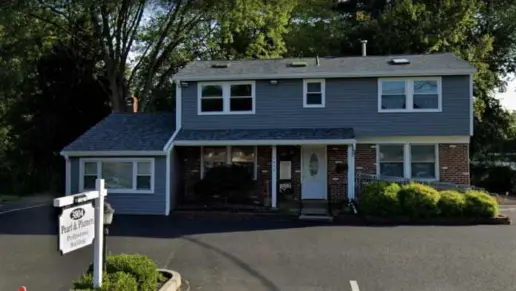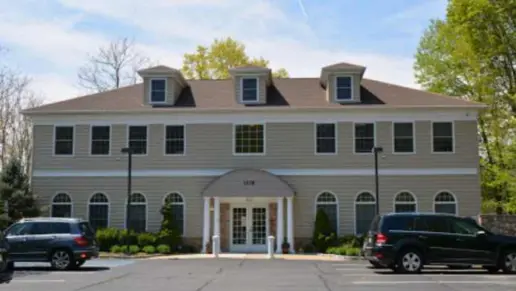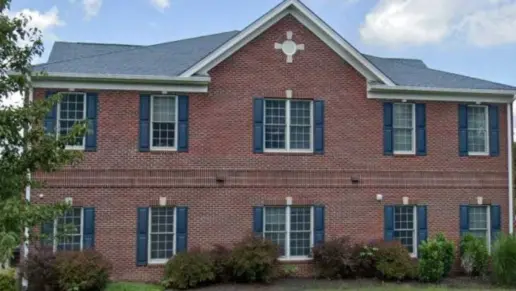About the Facility
GenPsych is located in West Windsor, New Jersey. The GenPsych Adolescent (GAP) West Windsor site offers a variety of mental health and dual diagnosis programs for children (8-12) and teens (13-17).
The partial hospitalization program meets up to thirty hours a week. One-on-one counseling, group counseling, relapse prevention services, educational classes, and eating disorder treatment are available.
The intensive outpatient program meets up to nine hours a week. Individual counseling, group counseling, educational classes, skills classes, and relapse prevention programming are provided.
The outpatient program is offered to those with a wide variety of needs. Evidence-based treatment programming is provided in combination with clinical therapy and academic options for adolescents struggling in school.
GenPsych Bridgewater accepts most insurance plans, including Beacon, Tricare, HCSC, Ambetter, Kaiser, and more. Out-of-network benefits may vary, so it’s important to verify coverage with the provider prior to starting treatment.
 Accreditations
Accreditations

Joint Commission
The Joint Commission, formerly known as JCAHO, is a nonprofit organization that accredits rehab organizations and programs. Founded in 1951, the Joint Commision's mission is to improve the quality of patient care and demonstrating the quality of patient care.
Joint Commission Accreditation: Yes

State License
State Licenses are permits issued by government agencies that allow rehab organizations to conduct business legally within a certain geographical area. Typically, the kind of program a rehab facility offers, along with its physical location, determines which licenses are required to operate legally.
State License: New Jersey
 Treatment
Treatment
 Alcoholism
Alcoholism
Alcoholism (alcohol use disorder) is diagnosed when a person’s drinking causes harm or distress and they continue to drink anyway. Often, they have a physical as well as psychological dependence on the substance. To treat alcohol addiction, medical detox is often necessary to safely withdraw from alcohol. Once this is complete, alcohol rehab in New Jersey can provide skills and supports necessary for long-term recovery.
 Drug Addiction
Drug Addiction
Drug rehab in New Jersey is the process of addressing the complex issues involved with addiction. Challenges are identified and addressed through individual and group counseling. Participants learn how to manage these issues without the use of substances.
 Dual Diagnosis
Dual Diagnosis
New Jersey has a variety of dual-diagnosis addiction treatment programs, including inpatient and outpatient drug and alcohol rehabs, that recognize the unique needs of individuals with co-occurring substance use disorders and mental health conditions. These programs typically employ evidence-based therapies such as cognitive-behavioral therapy (CBT), dialectical behavior therapy (DBT), trauma-focused therapy, and art therapy to successfully address co-occurring disorders and support sustained recovery.
 Mental Health and Substance Abuse
Mental Health and Substance Abuse
New Jersey has a range of mental health and substance abuse treatment programs providing dual-diagnosis treatment. These rehabs provide effective treatment for co-occurring disorders, which typically involves an inpatient or outpatient program. Treatment often includes a mental health evaluation, individualized treatment plan, individual and group therapy, evidence-based interventions like cognitive behavioral therapy, and psychoeducation. When combined, these programs and therapeutic interventions can successfully address co-occurring disorders to improve mental health and well-being.
 Opioid Addiction
Opioid Addiction
Opioid rehabs specialize in supporting those recovering from opioid addiction. They treat those suffering from addiction to illegal opioids like heroin, as well as prescription drugs like oxycodone. These centers typically combine both physical as well as mental and emotional support to help stop addiction. Physical support often includes medical detox and subsequent medical support (including medication), and mental support includes in-depth therapy to address the underlying causes of addiction.
 Insurance and Financial
Insurance and Financial
Daily
Private insurance
Self-pay options
Financing available
Military insurance
Per session
 Programs
Programs
 Adolescence program
Adolescence program
 Military program
Military program
The Military Program at GenPsych offers treatment specifically designed for the unique needs of active duty service members and veterans from all military branches. Active and past military duty brings unique challenges, sacrifices, and stresses to service members and their families. It’s not uncommon to feel anxiety, depression, or other negative emotions related to your deployment, service, or combat–and sometimes these feelings can be hard to manage. Their Military Program uses proven methods to help you deal with these unique experiences in a discrete, safe setting without fear of being judged.
 Program for men
Program for men
 Program for women
Program for women
 Levels of Care
Levels of Care
 Outpatient
Outpatient
Outpatient rehabs enable clients to receive a full continuum of care while continuing to live at home. They’re often ideal for clients who are stepping down from inpatient care but some clients may prefer to transition into outpatient treatment immediately after completing detox. Many outpatient facilities also offer ambulatory medical detox for low-risk clients. Outpatient treatment generally includes psychotherapy and life skills training. Clients in opioid and/or alcohol recovery may also receive medication assisted treatment (MAT).
 Medically Assisted Detox
Medically Assisted Detox
A medical detox is the safest way to wean your body off addictive substances. When you become physically dependent on alcohol or drugs, quitting abruptly can cause a host of challenging and uncomfortable withdrawal symptoms. In medically assisted detox, a team of medical professionals will be on hand to monitor any symptoms, to provide medication if possible, and to help keep you as safe and as comfortable as possible throughout this process.
 Intensive Outpatient
Intensive Outpatient
Clients who are exiting inpatient rehab, those who are experiencing crisis, and those who prefer to live at home while in treatment typically enroll in intensive inpatient programs (IOP). These programs feature frequent and robust care, generally requiring clients to participate in at least nine hours of care weekly, though many intensive outpatient rehabs offer up to 20 treatment hours per week. IOP services typically combine individual, group, and family counseling with recovery education and holistic therapies.
 12-Step
12-Step
Participants in 12 step programs engage in a rigorous process of personal growth as a cornerstone of long-term recovery. They are expected to attend anonymous, peer-led 12 step meetings, which are free, open to the public, and available multiple times per day in most communities. Though these programs are rooted in spiritual principles, religious affiliation is not required. Self-selected peer sponsors mentor participants as they work through the 12 steps, learning forgiveness, understanding, acceptance, and accountability.
 Aftercare Support
Aftercare Support
Completing a drug or alcohol rehab program shouldn't spell the end of substance abuse treatment. Aftercare involves making a sustainable plan for recovery, including ongoing support. This can include sober living arrangements like halfway houses, career counseling, and setting a patient up with community programs like Alcoholics Anonymous (AA) or Narcotics Anonymous (NA).
 Clinical Services
Clinical Services
Cognitive Behavioral Therapy
Cognitive Behavioral Therapy (CBT) is a therapy modality that focuses on the relationship between one's thoughts, feelings, and behaviors. It is used to establish and allow for healthy responses to thoughts and feelings (instead of unhealthy responses, like using drugs or alcohol). CBT has been proven effective for recovering addicts of all kinds, and is used to strengthen a patient's own self-awareness and ability to self-regulate. CBT allows individuals to monitor their own emotional state, become more adept at communicating with others, and manage stress without needing to engage in substance abuse.
Creative Arts Therapy
Creativity is inherently healing, and can help those in recovery express thoughts or feelings they might not otherwise be able to. Creative arts therapy can include music, poetry/writing, painting, sculpting, dance, theater, sandplay, and more. Unlike traditional art, the final product matters far less than the experience of creation and expression itself.
Dialectical Behavior Therapy
The core skills of DBT are zen mindfulness-based, teaching clients how to increase awareness by noticing thoughts, feelings, and body sensations, and then strengthening attention back to the present moment. There are programs available to treat both adults and adolescents within a rolling twelve week skills training cycle. GenPsych is unique because they are dedicated to implementing the philosophies and strategies of DBT not only within their fully structured DBT program, but in their Mental Health and Substance programs as well.
Eating Disorder Treatment
Eating disorders are complicated medical illnesses that can seriously harm your emotional, spiritual, and physical health. Beyond being obsessed with food and body image, many individuals with this affliction also suffer from depression, anxiety, or other overwhelming issues. GenPsych’s Healthy Eating And Living (HEAL) Program will help you break free from the debilitating rules and obsessions of disordered eating and thinking, so that you can have a more peaceful relationship with food, your body, and your life.
Experiential Therapy
Experiential therapy is a form of therapy in which clients are encouraged to surface and work through subconscious issues by engaging in real-time experiences. Experiential therapy departs from traditional talk therapy by involving the body, and having clients engage in activities, movements, and physical and emotional expression. This can involve role-play or using props (which can include other people). Experiential therapy can help people process trauma, memories, and emotion quickly, deeply, and in a lasting fashion, leading to substantial and impactful healing.
Eye Movement Desensitization and Reprocessing
EMDR is a therapeutic modality originally developed to help process trauma. In an EMDR session, a patient is prompted to undergo eye movements that mimic those of REM sleep. This is accomplished by watching a therapist's finger move back and forth across, or following a bar of light. The goal is repetitive sets of eye movements that help the brain reprocess memory, which can significantly reduce the intensity of remembered traumatic incidents. Associated memories can heal simultaneously, leaving patients significantly calmer, more stable, and more emotionally relaxed.
Family Therapy
The DBT Multi-Family Group allows the family members of current clients to learn the same DBT skills their loved ones are practicing in program. All 5 modules of DBT are covered as a way to help support and manage their loved ones in the home. With the support of a clinical DBT staff, families can work towards building a life worth living.
Group Therapy
Group therapy is any therapeutic work that happens in a group (not one-on-one). There are a number of different group therapy modalities, including support groups, experiential therapy, psycho-education, and more. Group therapy involves treatment as well as processing interaction between group members.
Individual Therapy
In individual therapy, a patient meets one-on-one with a trained psychologist or counselor. Therapy is a pivotal part of effective substance abuse treatment, as it often covers root causes of addiction, including challenges faced by the patient in their social, family, and work/school life.
Life Skills
Life skills trainings involve all the skills a person must have in order to function successfully in the world. These include time management, career guidance, money management, and effective communication. Truly successful addiction recovery is based on the ability to not only live substance-free, but to thrive. Life skills teaches the practical necessities of functioning in society, which sets clients up for success in life, and therefore sobriety.
Motivational Interviewing
Motivational Interviewing (MI) is a clinical approach to helping people with substance abuse issues and other conditions shift behavior in positive ways. It is more goal-oriented than traditional psychotherapy, as MI counselors directly attempt to get clients to consider making behavioral change (rather than wait for them to come to conclusions themselves). Its primary purpose is to resolve ambivalence and help clients become able to make healthy choices freely.
Nutrition Therapy
Nutrition therapy, aka medical nutrition therapy (MNT), is a way of treating physical, emotional, and medical conditions through diet. Specific dietary plans are designed by professional nutritionists or registered dietitians, and patients follow them in order to positively affect their physical and mental health.
Trauma Therapy
Trauma therapy addresses traumatic incidents from a client's past that are likely affecting their present-day experience. Trauma is often one of the primary triggers and potential causes of addiction, and can stem from child sexual abuse, domestic violence, having a parent with a mental illness, losing one or both parents at a young age, teenage or adult sexual assault, or any number of other factors. The purpose of trauma therapy is to allow a patient to process trauma and move through and past it, with the help of trained and compassionate mental health professionals.
 Settings and Amenities
Settings and Amenities
-
Private setting
-
Yoga studio
-
Recreation room
-
Music room
-
Meditation room
-
Art activities
 Contact
Contact
200 Rt 31 North
Flemington NJ, 08822


